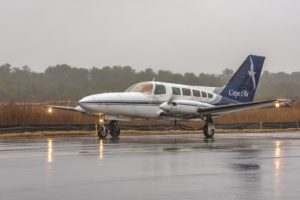PROVINCETOWN — Over New Year’s weekend, Cape Air grappled with a spike in symptomatic Covid-19 cases among its work force. As of Monday, Jan. 3, the airline had 30 staff members testing positive, 17 of those just over the previous three days. Most of those on sick leave were frontline employees, including pilots, maintenance technicians, and airport services personnel.
“That’s more than we’ve ever had since the beginning of the pandemic,” said Linda Markham, who took over from Dan Wolf this week as the company’s CEO.
Cape Air’s in-house Covid-19 task force scrambled to rebound as pilots called in sick one after the next. For staffing holes in the Northeast, the airline leaned on its “SAMP” — that is, its standby “Small Army of Management Pilots,” who can be deployed at any time. And on Sunday, Jan. 2, the task force announced a new incentive pay plan, hoping this would encourage healthy pilots to pick up extra shifts.
Cape Air, in total, has approximately 90 pilots. As of Monday, 21 of them had signed up to cover 78 additional shifts. “That helps us greatly,” Markham said.
But the airline is hard pressed to recover flights on its midwestern routes and its Montana network.
Cape Air canceled 2.4 percent of its flights in December because of Covid sick calls. A year earlier, in December 2020, the airline had no cancellations at all. Only three flights into or out of Provincetown Municipal Airport were canceled last month.
These statistics, at first glance, may seem like only a blip on the radar, but “that’s still going to have an impact on our customers,” Markham said.
Cape Air currently has about 750 employees. Throughout the pandemic, that number has held steady, varying between 700 and 750, but “our biggest challenge right now,” said Markham, “is pilot staffing.”
That is by no means a problem unique to Cape Air. The airline industry at large has been dealing with a pilot shortage — and Covid-19 made matters worse when it pushed both major and regional airlines to furlough workers and encourage early retirements. Cape Air was able to avoid these measures, promising its pilots that their jobs were secure, but the airline’s own staffing issues emerged after their competitors withdrew those furlough policies and resumed hiring. What followed was, as Markham put it, a “feeding frenzy.”

“Our pilots were ripe for the picking,” she said, “because they come from such a well-structured training environment and are well qualified to go on to regional airlines.”
Cape Air’s fleet of Cessna 402 and Tecnam P2012 planes, which are the backbone of the airline, “require you to be a good stick-and-rudder pilot,” said Ryan Baker, the airline’s chief pilot.
This, in turn, makes Cape Air pilots desirable candidates for other airlines operating larger aircraft, which, by contrast, are highly automated. “You’re sort of just sitting there, monitoring instruments and the automation of the aircraft,” Baker said, “as opposed to actually flying the airplane.” But as a result, “people come here to spend a few years and then move on,” he added.
In an attempt to retain pilots, the airline has been patching together what it calls pathway programs. If Cape Air pilots serve as captains for at least two years, they will then be guaranteed a position at Spirit Airlines. Cape Air has a similar agreement for fresh-out-of-college pilots in its university gateway program, which can clinch for these young professionals an eventual job at JetBlue.
“The gateway program is one of the first ones put together in the country,” said Baker. “We’re pretty proud of that.”
Cape Air, meanwhile, has started gathering the vaccination status of its employees for a database, prepping for an upcoming federal regulation aimed at employers with 100 or more employees. OSHA will be requiring all such private companies to ensure that their workers are either vaccinated or tested weekly for Covid-19.
“We just need to get through the next few weeks,” Markham said. “I’m really hoping that people who get this variant of Covid can get back on track and be able to get down to business.”



